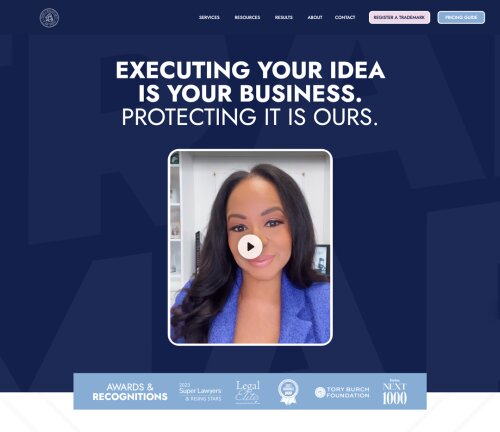Best Trademark Lawyers in Charlotte
Share your needs with us, get contacted by law firms.
Free. Takes 2 min.
List of the best lawyers in Charlotte, United States
About Trademark Law in Charlotte, United States
Trademark law in Charlotte, United States refers to the legal protection granted to marks, logos, symbols, and names that identify and distinguish the goods or services of one party from those of others. Trademarks play a crucial role in branding and marketing, and they can be registered with the United States Patent and Trademark Office (USPTO) to provide exclusive rights to their owners.
Why You May Need a Lawyer
There are several situations where you may need a lawyer specializing in trademark law in Charlotte, United States. Some common reasons include:
- Registering a trademark
- Enforcing your trademark rights against infringers
- Defending against claims of trademark infringement
- Negotiating licensing agreements
Local Laws Overview
In Charlotte, United States, trademark law is governed by federal statutes such as the Lanham Act, as well as state laws and regulations. It is important to understand the specific requirements and processes for registering and protecting trademarks at both the federal and state levels. Additionally, Charlotte may have its own local ordinances or rules that impact trademark rights.
Frequently Asked Questions
Q: How do I register a trademark in Charlotte, United States?
A: To register a trademark in Charlotte, United States, you must file an application with the USPTO and meet certain eligibility requirements.
Q: What are the benefits of registering a trademark?
A: Registering a trademark provides legal protection, exclusive rights to use the mark, and the ability to bring legal action against infringers.
Q: How long does a trademark registration last?
A: A trademark registration can last indefinitely if the mark is continuously used and properly maintained.
Q: What is trademark infringement?
A: Trademark infringement occurs when someone uses a mark that is confusingly similar to a registered trademark, leading to consumer confusion.
Q: Can I trademark a slogan or logo?
A: Yes, slogans, logos, and other distinctive elements can be trademarked if they meet the requirements for protection.
Q: How can a lawyer help with trademark enforcement?
A: A lawyer can help monitor for infringement, send cease-and-desist letters, and file legal actions to protect your trademark rights.
Q: What is a trademark search?
A: A trademark search involves checking existing trademarks to ensure that your proposed mark is not already in use.
Q: Can I trademark a name for a new product?
A: Yes, product names can be trademarked to distinguish them from competitors and build brand recognition.
Q: What is the difference between a trademark and a copyright?
A: A trademark protects branding elements like names and logos, while a copyright protects original works of authorship like books and music.
Q: How can I resolve a trademark dispute without litigation?
A: Mediation, arbitration, or negotiated settlements can be options to resolve trademark disputes amicably without going to court.
Additional Resources
If you need legal assistance with trademark matters in Charlotte, United States, consider contacting the following resources:
- Charlotte Intellectual Property Law Association
- North Carolina Bar Association - Intellectual Property Section
- United States Patent and Trademark Office
Next Steps
If you require legal assistance with trademark matters in Charlotte, United States, it is advisable to consult with a qualified trademark lawyer who can provide guidance and representation tailored to your specific needs. Research potential attorneys, schedule consultations, and discuss your trademark goals and concerns to find the right legal advocate for your case.
Lawzana helps you find the best lawyers and law firms in Charlotte through a curated and pre-screened list of qualified legal professionals. Our platform offers rankings and detailed profiles of attorneys and law firms, allowing you to compare based on practice areas, including Trademark, experience, and client feedback.
Each profile includes a description of the firm's areas of practice, client reviews, team members and partners, year of establishment, spoken languages, office locations, contact information, social media presence, and any published articles or resources. Most firms on our platform speak English and are experienced in both local and international legal matters.
Get a quote from top-rated law firms in Charlotte, United States — quickly, securely, and without unnecessary hassle.
Disclaimer:
The information provided on this page is for general informational purposes only and does not constitute legal advice. While we strive to ensure the accuracy and relevance of the content, legal information may change over time, and interpretations of the law can vary. You should always consult with a qualified legal professional for advice specific to your situation.
We disclaim all liability for actions taken or not taken based on the content of this page. If you believe any information is incorrect or outdated, please contact us, and we will review and update it where appropriate.









